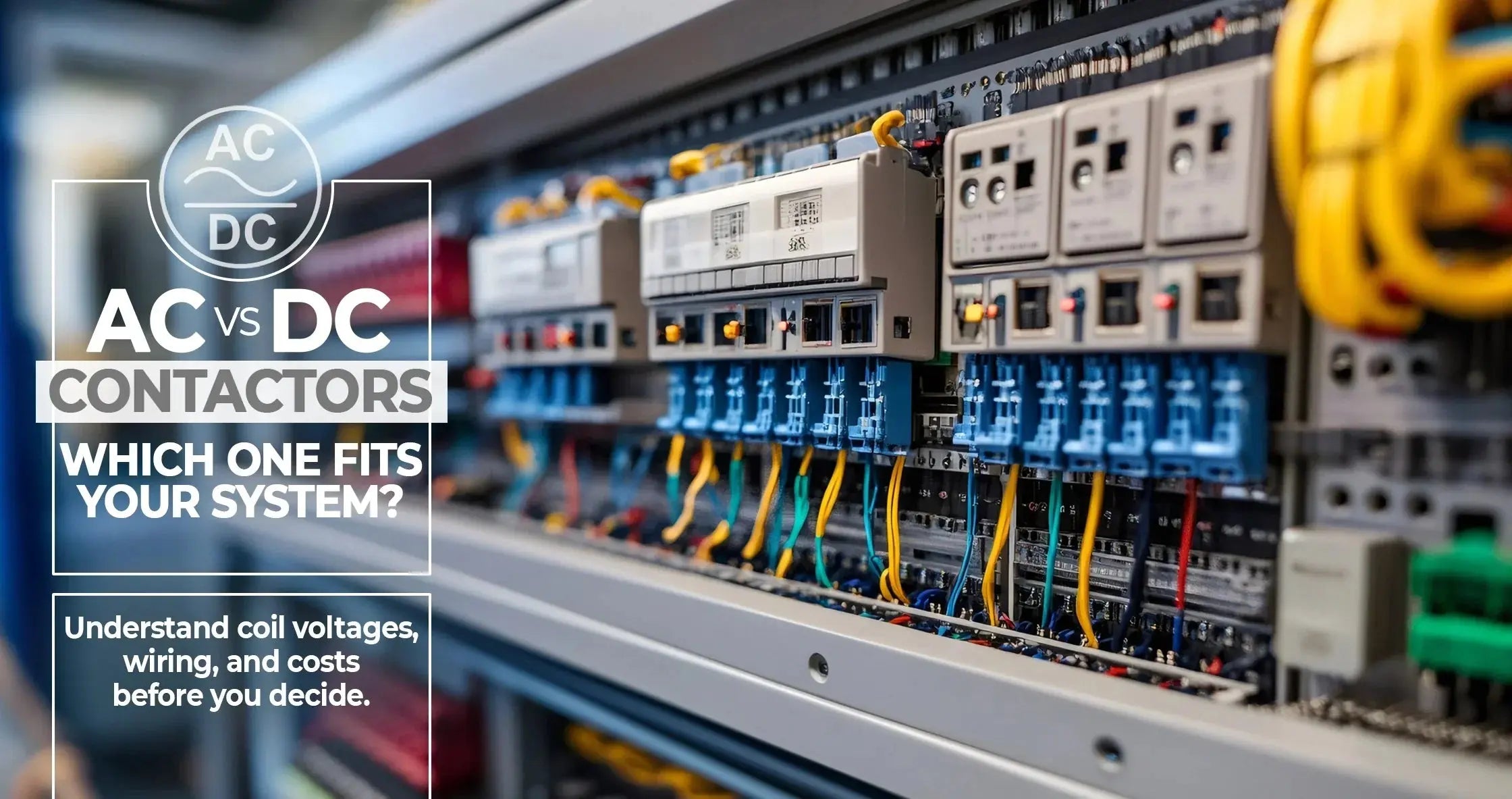When selecting the right electrical contactor for your application, one of the first decisions you need to make is whether to choose an AC or DC contactor. The AC DC contactor you select will affect performance, compatibility, installation effort, and budget. In this comprehensive guide, we will compare AC and DC contactors by focusing on their coil voltage types, wiring differences, cost implications, and ultimately help you choose the best option for your needs.
What Is an AC DC contactor?
A contactor is an electrically-controlled switch used for switching an electrical power circuit. Contactors are used in motor control, lighting, heating, and various other electrical systems. Depending on the type of coil voltage supplied, contactors are categorized as AC contactors and DC contactors.
AC contactors are designed to operate on alternating current, typically 24V, 110V, 230V, or 415V AC. DC contactors operate on direct current such as 12V, 24V, 48V, or 110V DC. The design of these contactors differs to suit the behavior of AC or DC power.
AC DC contactor: Coil Voltage Comparison
The type of coil voltage used in a AC DC contactor significantly impacts performance and application. Here’s a comparison:
AC Coil Contactors
- Common Voltages: 24V AC, 110V AC, 230V AC, 415V AC
- Application: Industrial machines, HVAC, lighting control, motor starters
- Pros: Readily available, simple wiring, cheaper
- Cons: Susceptible to buzzing, requires inrush current
DC Coil Contactors
- Common Voltages: 12V DC, 24V DC, 48V DC, 110V DC
- Application: Solar systems, battery-powered applications, control circuits
- Pros: Quiet operation, no inrush current, stable magnetic field
- Cons: More expensive, larger size, needs arc suppression
When evaluating an AC DC contactor, it’s crucial to match the coil voltage to your control circuit to ensure proper performance and avoid damage.
AC DC contactor Wiring Differences
AC Contactor Wiring
AC contactors generally require fewer wiring precautions. They typically connect directly to an AC supply and have built-in suppressors to handle voltage spikes.
Advantages:
- Straightforward installation
- No polarity concerns
- Compatible with most relay circuits
DC Contactor Wiring
DC contactors are more sensitive to wiring practices:
- Polarity-sensitive: DC contactors must be wired with correct polarity
- Arc suppression is critical, as DC arcs do not self-extinguish like AC arcs
- Snubber circuits or diodes are usually needed to protect the circuit
Because of these factors, DC contactor installation may require more technical knowledge and protection devices compared to AC contactors.
Cost Comparison: AC vs DC Contactors
The cost difference between AC and DC contactors is an important factor in selection:
|
Feature |
AC Contactor |
DC Contactor |
|
Price |
Lower |
Higher |
|
Maintenance |
Lower |
Higher (due to arc wear) |
|
Accessories Needed |
Fewer |
More (snubbers, diodes) |
|
Size |
Compact |
Bulkier |
Why DC Contactors Cost More:
- Require arc suppression systems
- Stronger magnetic coils to maintain stable arc
- Higher material costs
Still, DC contactors are preferred for specific environments such as battery banks, electric vehicles, or renewable energy systems.
Selecting the Right AC DC contactor: Key Factors
To ensure proper selection of an AC DC contactor, consider the following:
1. Control Voltage
Match your coil voltage with your system’s control power (e.g., 24V DC for solar systems, 230V AC for industrial control panels).
2. Load Type
Inductive loads like motors demand different utilization categories than resistive loads like lighting. Refer to IEC utilization categories (AC1, AC3, DC1, etc.).
3. Application Environment
If vibration, temperature, or noise is a concern, DC contactors offer quieter and more stable performance. In less sensitive environments, AC contactors offer economical benefits.
4. Frequency of Operation
DC contactors are better suited for frequent switching due to reduced wear from arc suppression. AC contactors may wear out quicker in such scenarios.
5. Budget and Maintenance
Evaluate your long-term maintenance costs. While AC contactors are cheaper upfront, DC contactors may reduce noise and wear in the long run.
Common Mistakes in AC DC contactor Selection
- Ignoring coil voltage ratings: Leads to coil burnout or failure
- Wrong utilization category: May result in premature contact wear
- No arc suppression on DC contactors: Causes excessive pitting and damage
- Mixing AC coils on DC circuits (and vice versa): Can be dangerous and cause malfunction
AC DC contactor Use Cases
Use AC Contactors for:
- HVAC systems
- Lighting panels
- Pump and motor starters
Use DC Contactors for:
- Solar inverters
- Battery management systems
- Electric vehicles
- Control circuits in automated systems
Conclusion: Choose the Right Contactor for Maximum Safety and Efficiency
Understanding the differences in coil voltage, wiring requirements, and cost implications is essential for selecting the right AC DC contactor. AC contactors are economical and easy to install, making them suitable for general-purpose applications. DC contactors, although costlier, offer quiet and stable operation for specialized systems.
Whether you’re working on a residential HVAC panel, an industrial control cabinet, or a solar-powered automation system, choosing the correct contactor improves reliability, reduces downtime, and saves costs in the long run.
Explore our curated contactor collections for your application at IndustrialElectricalWarehouse.
Your system deserves the right start—choose the contactor that fits best.


